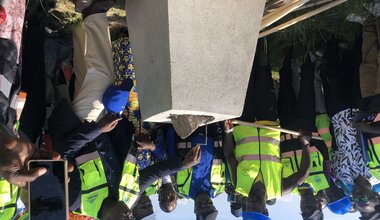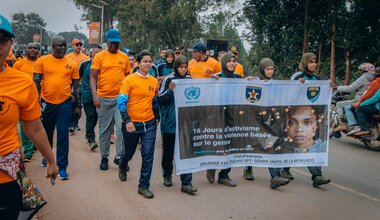Reflection on the Evolution of Civil Society in the DRC
Kinshasa, 4 July 2011 - Four years on, exactly since July 2007, the Civil Affairs Section of the United Nations Stabilization Mission in the Democratic Republic of Congo (MONUSCO) and its partners, including the European Union (EU), the South African-based Electoral Institute for the Sustainability of Democracy in Africa (EISA), and the United Nations Development Fund (UNDP), in cooperation with the Congolese Ministry of Planning, have bolstered the efforts of Civil Society Organizations (CSOs) in the Democratic Republic of Congo (DRC). One of the milestones of this long-term development plan was a Civil Society National Symposium, held in Kinshasa from 25 to 27 May 2009, which saw the participation of delegates from six provinces.
Over the past year, MONUSCO and UNDP have supported five of the 11 provinces in the development of Provincial Thematic Groups to increase the capacity of both civil society and state authorities to prioritize the agenda for development, such as the Poverty Reduction Strategy Paper (PRSP) II, in their respective areas. Maud Ropars, the Head of Civil Society Pillar for MONUSCO's Civil Affairs Section says a survey was conducted in late June "to understand how the support of MONUSCO and UNDP has contributed to more effective civil society engagement in the DRC, in particular dialogue with the authorities in the lead up to the national elections later this year."
According to Lucie Esabme, from "Comité de suivi de Masina", an evaluation mechanism based in Kinshasa, MONUSCO's support has helped them to improve their knowledge of CSOs and coordinate better with the Government on issues relating to the Provincial Action Plan (PAP). When Stella Yanda of Initiative Alpha in South Kivu was asked about the positive aspect of this process, she responded "CSOs in South Kivu are now part of the solution, because through the thematic groups they work directly with the government on social services issues and are not excluded from political dialogue." Furthermore, actors in Kasai Occidental said that "... prior to MONUSCO's and UNDP's involvement, CSOs were fractured. Thanks to MONUSCO this has translated into better representation of community opinion when discussing the priority themes for the upcoming budget year."
This exercise reveals not only the development of CSOs in the DRC but also the difference in the provincial priorities. For example, in North Kivu, CSOs will focus on elections, poverty reduction, security and rehabilitation, while in South Kivu the CSOs are firmly focused on the issues of civic education, free and fair elections, and reforming the security situation.
MONUSCO's Civil Affairs and UNDP continue to work in partnership with the United Nations Country Team to support both the evolution of civil society and bolster the role of the state through civic education. For more information on CAS Support to Civil Society Organizations (CSOs) look here on the Civil Affairs Section of the MONUSCO website.
Marjorie Henderson and Hortense Shidi/ MONUSCO
 UN
UN United Nations Peacekeeping
United Nations Peacekeeping









